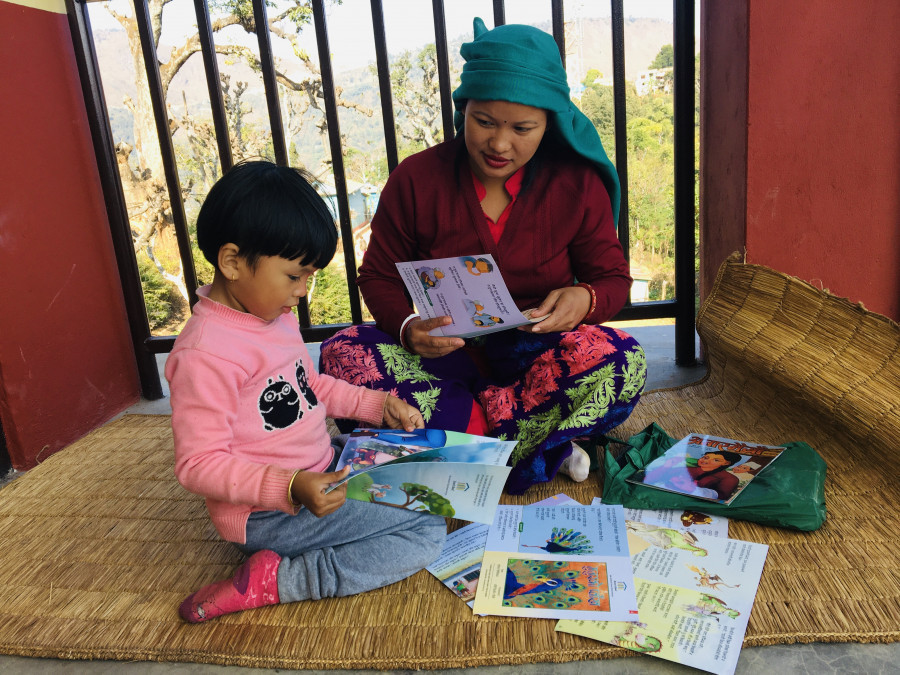Columns
Promoting Nepal’s reading culture
The government should establish well-equipped libraries and reading corners in schools, colleges and public spaces.
Pushpa Raj Joshi
Books are the gateway to knowledge, creative imagination and personal growth for an individual, and they hold the power to inspire, educate and transform lives. Encouraging reading habits from an early age and creating an environment for readers of all ages is an all-important step for a country’s intellectual and social development. Children exposed to a plump vocabulary through reading—particularly children's books—have a higher score on general intelligence tests, leading to higher intelligence later in life. Extracurricular books provide opportunities to explore a wide range of subjects beyond the scope of academic textbooks. Books allow readers to delve into diverse topics such as history, science, philosophy, and psychology among others. This broadens their knowledge base and enhances their understanding and perception of the world.
In Nepal, however, children are compelled to engage solely in conventional textbooks and are generally discouraged from reading extracurricular books. In fact, reading culture has never been widely promoted in Nepal, and even now, the anti-reading attitude is restraining the new generation from attaining behavioural knowledge and enhancing their intellectual competence. To make matters worse, internet-based entertainment activities and unproductive online games are diverting children’s attention.
Studies have shown that reading extracurricular books helps in knowledge expansion, improved language skills, enhanced empathy, relaxation, and a positive influence on various aspects of life. Moreover, reading can be an effective way to unwind and de-stress. Immersing in a captivating book can transport individuals to different worlds, helping them temporarily escape their worries. Extracurricular books can help improve academic performance by enhancing reading comprehension, critical thinking and analytical skills.
Books with diverse topics tackle complex ideas and themes, stimulating critical thinking and intellectual growth. They encourage readers to analyse, evaluate and form opinions on different topics, fostering cognitive development and enhancing problem-solving abilities. Due to these positive fallouts, reading habit is being promoted worldwide. Many state-funded libraries with books on diverse topics can be found in many conurbations of the world, be it a metropolitan city or a small town. Defunct and abandoned telephone booths in Germany have been converted into mini-libraries for convenient book exchange. Many mobile libraries, or libraries on wheels, bring books to people’s doorsteps and are also popular in other countries.
Unfortunately, the national intellectual quotient of Nepal is declining. Keeping this in mind, the government and educational authorities should promote and establish a reading culture in Nepal. The current rote memorisation educational approach should be replaced with a focus on learning by doing attitude and extra-curricular reading. This can be done by overhauling our education system and including extra-curricular and behavioural books in the curriculum. Following are some of the steps that can be helpful in promoting a vibrant reading culture in Nepal.
First, ubiquitous and easy book access should be ensured at the community level. In collaboration with educational institutions, NGOs and other stakeholders, the government should invest in well-equipped libraries and reading corners in schools, colleges and public spaces. These libraries should cater to various interests, including literature, science, history, and local culture. Efforts should be made to improve the availability and affordability of books, including establishing globally accepted mobile libraries and book-sharing programmes.
Second, as the home environment plays a vital role in cultivating reading habits in children, parents should be encouraged to regularly read to their children from an early age and provided with guidance on selecting age-appropriate books. This reading ritual will ignite a lifelong love for books in children. In addition, the schools should organise reading workshops for parents, emphasising the benefits of reading and providing tips on creating a conducive reading environment at home. Collaborative efforts between schools and parents will significantly influence children's reading habits.
Third, literary festivals, book fairs, and author interactions should be regularly organised by showcasing various books, facilitating discussions, and promoting local authors and publishers. These events would create a buzz around reading and attract people of all ages. By inviting renowned writers, intellectuals, and literary figures, these events can inspire aspiring readers and writers, fostering a sense of community and appreciation for literature. Publishers should work closely with educational institutions to produce quality, affordable, and culturally relevant books in different languages. In addition, collaboration with authors should involve school visits, book signings, and storytelling sessions, thereby creating a direct connection between readers and writers. Such interactions inspire young minds and display the value of literature in society. A new generation of talented storytellers regularly publishing wonderful multilingual books on various topics is evolving with a bang in Nepal. These juveniles should be encouraged to publish more quality works by supporting them with pre- and post-publication formalities, including marketing and promoting their books. All books—be they textbooks or extra-curricular books—should be tax-free, and the government should provide a subsidiary.
Finally, technological interventions will be a powerful tool to promote reading in the contemporary digital era. The government and concerned educational authorities should focus on digitising books, making them available in electronic formats and establishing e-libraries. This will not only expand access to books but will also encourage the tech-savvy younger generation towards reading culture. Furthermore, developing mobile apps and online platforms dedicated to reading, providing book recommendations, and facilitating discussions will enhance engagement and provide a platform for readers to connect and share their experiences.
There is immense potential to foster an effervescent reading culture among the people in Nepal, and so statutory policies should be directed in this direction. To achieve the feat of developing a thriving reading culture in Nepal, a multi-faceted approach involving government support, community participation, and educational initiatives is required.




 9.7°C Kathmandu
9.7°C Kathmandu















